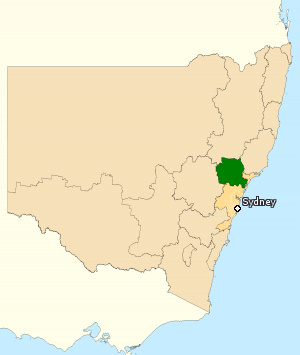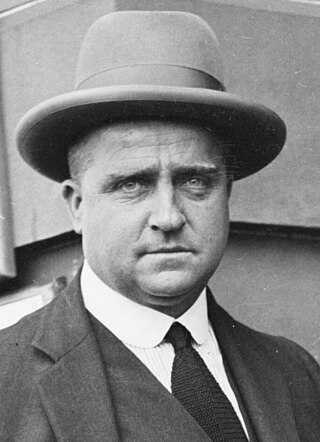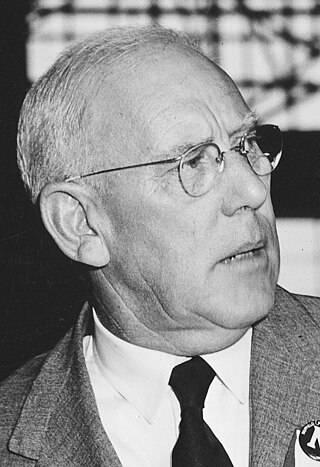
The Division of Hunter is an Australian electoral division in the state of New South Wales. The division was proclaimed in 1900, and was one of the original 65 divisions to be contested at the first federal election. The division was named after Captain John Hunter, the second Governor of New South Wales. It covers rural, regional and suburban areas centred on the Hunter Valley, including the towns of Singleton, Muswellbrook and Cessnock. It also extends into parts of Greater Newcastle, covering suburbs such as Cameron Park, Edgeworth, Toronto and Morisset.

The Division of Newcastle is an Australian electoral division in the state of New South Wales.

Lang Labor was a faction of the Australian Labor Party (ALP) consisting of the supporters of Jack Lang, who served two terms as Premier of New South Wales and was the party's state leader from 1923 to 1939. It controlled the New South Wales branch of the ALP throughout most of the 1920s and 1930s. The faction broke away to form separate parliamentary parties on several occasions and stood competing candidates against the ALP in state and federal elections.

The 2007 New South Wales state election was held on Saturday, 24 March 2007. The entire Legislative Assembly and half of the Legislative Council was up for election. The Labor Party led by Morris Iemma won a fourth four-year term against the Liberal-National coalition led by Peter Debnam.
Wallsend is an electoral district of the Legislative Assembly in the Australian state of New South Wales. It has only ever been represented by a member of the Labor Party and is currently represented by Sonia Hornery.

David Watkins was an Australian politician. He was an Australian Labor Party member of the New South Wales Legislative Assembly for Wallsend from 1894 until 1901. At Federation, he was elected to the new Australian House of Representatives as the Labor member for Newcastle and served until his death in 1935. Watkins' death left former Prime Minister Billy Hughes as the only remaining member of the First Parliament still in the House.

John Lionel Fegan was a politician and coal miner in New South Wales, Australia.

The 1999 New South Wales state election was held on Saturday, 27 March. All seats in the New South Wales Legislative Assembly and half the seats in the New South Wales Legislative Council was up for election. The Incumbent New South Wales Premier Bob Carr won a second term with a 7% swing of vote against the Liberal National Party led by Kerry Chikarovski. The poll was the first to be held after two key changes to the electoral system. In 1997, the number of electoral districts was reduced from 99 to 93. In 1995, fixed four-year terms were introduced. As of 2023, this is the most recent NSW election in which the leader of the winning party would complete a full term as premier.
Members of the New South Wales Legislative Assembly who served in the 54th parliament held their seats from 2007 to 2011. They were elected at the 2007 state election, and at by-elections. The Speaker was Richard Torbay.

David Oliver Watkins was an Australian politician. He was an Australian Labor Party member of the Australian House of Representatives from 1935 until 1958, representing the electorate of Newcastle.

A by-election was held for the New South Wales Legislative Assembly seat of Ryde on 18 October 2008 to coincide with the Port Macquarie, Lakemba and Cabramatta by-elections. The by-election was triggered by the resignation of sitting member and Deputy Premier John Watkins, who cited exhaustion and the lack of time spent with his family for his resignation. Watkins resigned as Deputy Premier and Minister for Transport and retired from parliament on 8 September 2008, prompting a Cabinet reshuffle.
This article provides information on candidates who stood for the 1937 Australian federal election. The election was held on 23 October 1937.

The 2011 New South Wales state election held on Saturday, 26 March 2011. The 16-year-incumbent Labor Party government led by Premier Kristina Keneally was defeated in a landslide by the Liberal–National Coalition opposition led by Barry O'Farrell.

John Estell was a politician and coal miner in New South Wales, Australia. He was a member of the New South Wales Parliament for 29 years, including 20 years in the Legislative Assembly. He was a minister in the Holman, Storey and Dooley Labor governments.
Members of the New South Wales Legislative Assembly who served in the 33rd parliament held their seats from 1941 to 1944. They were elected at the 1941 state election, and at by-elections. During this term, the opposition United Australia Party merged with the new Commonwealth Party to form the Democratic Party in late 1943. The merger was only at a state level, however; the federal United Australia Party, however, remained intact during this period. The Speaker was Daniel Clyne.

The 1935 New South Wales state election was held on 11 May 1935. This election was for all of the 90 seats in the 31st New South Wales Legislative Assembly and was conducted in single member constituencies with compulsory preferential voting.

The 1950 New South Wales state election was held on 17 June 1950. It was conducted in single member constituencies with compulsory preferential voting and was held on boundaries created at a 1949 redistribution. The election was for all of the 94 seats in the Legislative Assembly, which was an increase of 4 seats since the previous election.

The 1956 New South Wales state election was held on 3 March 1956. It was conducted in single member constituencies with compulsory preferential voting and was held on boundaries created at a 1952 redistribution. The election was for all of the 94 seats in the Legislative Assembly.

Matthew Charlton was an Australian politician who served as leader of the Australian Labor Party (ALP) and Leader of the Opposition from 1922 to 1928. He led the party to defeat at the 1922 and 1925 federal elections.

The 1901 New South Wales state election was held on 3 July 1901 for all of the 125 seats in the 19th New South Wales Legislative Assembly and it was conducted in single-member constituencies with a first past the post voting system. The Parliamentary Electorates Act of 1893 had conferred the right to vote on every male British subject over 21 years of age who was resident in New South Wales for a year or more. The 19th parliament of New South Wales was dissolved on 11 June 1901 by the Governor, Lord Beauchamp, on the advice of the Premier, John See.
















